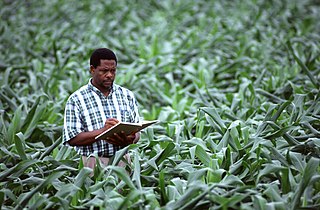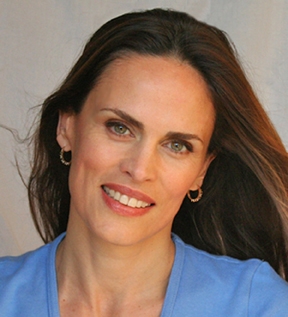Professional certification, trade certification, or professional designation, often called simply certification or qualification, is a designation earned by a person to assure qualification to perform a job or task. Not all certifications that use post-nominal letters are an acknowledgement of educational achievement, or an agency appointed to safeguard the public interest.
Coaching is a form of development in which an experienced person, called a coach, supports a learner or client in achieving a specific personal or professional goal by providing training and guidance. The learner is sometimes called a coachee. Occasionally, coaching may mean an informal relationship between two people, of whom one has more experience and expertise than the other and offers advice and guidance as the latter learns; but coaching differs from mentoring by focusing on specific tasks or objectives, as opposed to more general goals or overall development.
Professional development, also known as professional education, is learning that leads to or emphasizes education in a specific professional career field or builds practical job applicable skills emphasizing praxis in addition to the transferable skills and theoretical academic knowledge found in traditional liberal arts and pure sciences education. It is used to earn or maintain professional credentials such as professional certifications or academic degrees through formal coursework at institutions known as professional schools, or attending conferences and informal learning opportunities to strengthen or gain new skills.

An engineering technologist is a professional trained in certain aspects of development and implementation of a respective area of technology. An education in engineering technology concentrates more on application and less on theory than does an engineering education. Engineering technologists often assist engineers; but after years of experience, they can also become engineers. Like engineers, areas where engineering technologists can work include product design, fabrication, and testing. Engineering technologists sometimes rise to senior management positions in industry or become entrepreneurs.
A nutritionist is a person who advises others on matters of food and nutrition and their impacts on health. Some people specialize in particular areas, such as sports nutrition, public health, or animal nutrition, among other disciplines. In many countries, a person can claim to be a nutritionist even without any training, education, or professional license, in contrast to a dietitian, who has a university degree, professional license, and certification for professional practice.

The International Association of Privacy Professionals (IAPP) is a nonprofit, non-advocacy membership association founded in 2000. It provides a forum for privacy professionals to share best practices, track trends, advance privacy management issues, standardize the designations for privacy professionals, and to provide education and guidance on career opportunities in the field of information privacy. The IAPP offers a full suite of educational and professional development services, including privacy training, certification programs, publications and annual conferences. It is headquartered in Portsmouth, New Hampshire.

Certification is part of testing, inspection and certification and the provision by an independent body of written assurance that the product, service or system in question meets specific requirements. It is the formal attestation or confirmation of certain characteristics of an object, person, or organization. This confirmation is often, but not always, provided by some form of external review, education, assessment, or audit. Accreditation is a specific organization's process of certification. According to the U.S. National Council on Measurement in Education, a certification test is a credentialing test used to determine whether individuals are knowledgeable enough in a given occupational area to be labeled "competent to practice" in that area.

An agriculturist, agriculturalist, agrologist, or agronomist is a professional in the science, practice, and management of agriculture and agribusiness. It is a regulated profession in Canada, India, the Philippines, the United States, and the European Union. Other names used to designate the profession include agricultural scientist, agricultural manager, agricultural planner, agriculture researcher, or agriculture policy maker.

Justina Vail Evans, previously credited as Justina Vail, is a British actress, life coach, author and hypnotherapist.
The National Board for Certified Counselors, Inc. and Affiliates (NBCC) is an international certifying organization for professional counselors in the United States. It is an independent, not-for-profit credentialing organization based in Greensboro, North Carolina. The purpose of the organization is to establish and monitor a national certification system for professional counselors, to identify certified counselors, and to maintain a register of them. NBCC also certifies Coaches through its affiliate Center for Credentialing and Education. Individuals may earn the Board Certified Coach credential through third party programs, including online programs in Life Coaching and Psychosynthesis Coaching.

Sir John Henry Douglas Whitmore, 2nd Baronet was a pioneer of the executive coaching industry, an author and British racing driver.
The Biofeedback Certification International Alliance (BCIA) is an organization that issues certificates for biofeedback, which is "gaining awareness of biological processes".
The Liberian Institute of Certified Public Accountants (LICPA) is a professional association of accountants in Liberia.
Credentialing is the process of establishing the qualifications of licensed medical professionals and assessing their background and legitimacy.
PARfessionals is a private research development firm for Peer Support and Recovery Providers in Addictions.

The National Council on Strength and Fitness (NCSF) is a member-driven organization of exercise professionals located in Coral Gables, Florida. The NCSF board for certification oversees the National Commission for Certifying Agencies accredited credentialing programs and advocates on behalf of exercise professionals. In 2004, the NCSF organization expanded internationally, offering exercise professional credentialing worldwide. In partnership with Prometric Testing Services the organization provides accredited certification exams in over 10,000 centers within its global network.

The European Mentoring and Coaching Council (EMCC) provides coaching and mentoring professional accreditation, as well as support and guidance to the coaching and mentoring profession and for its members. It is one of a small number of such global coaching industry bodies which has led in representing the profession globally as well as within the European Union. It is the body which a large range of European organisations work with and/or recognise for coaching and mentoring qualifications, accreditations, code of ethics and frameworks.

Chartered Professional Accountants of Canada is the national organization representing the Canadian accounting profession through the unification of the three largest accounting organizations: the Canadian Institute of Chartered Accountants (CICA), the Society of Management Accountants of Canada and Certified General Accountants of Canada (CGA-Canada), as well as the 40 national and provincial accounting bodies. It is one of the largest organizations of its type in the world, with over 217,000 Chartered Professional Accountants in Canada and around the world.

Peter Chee is a Malaysian executive coach, author, and President of ITD World, a coaching and talent development corporation. He developed the Certified Chief Master Coach (CCMC) program and the Certified Coaching and Mentoring Professional (CCMP) Program. Both are accredited by the International Coach Federation (ICF).








